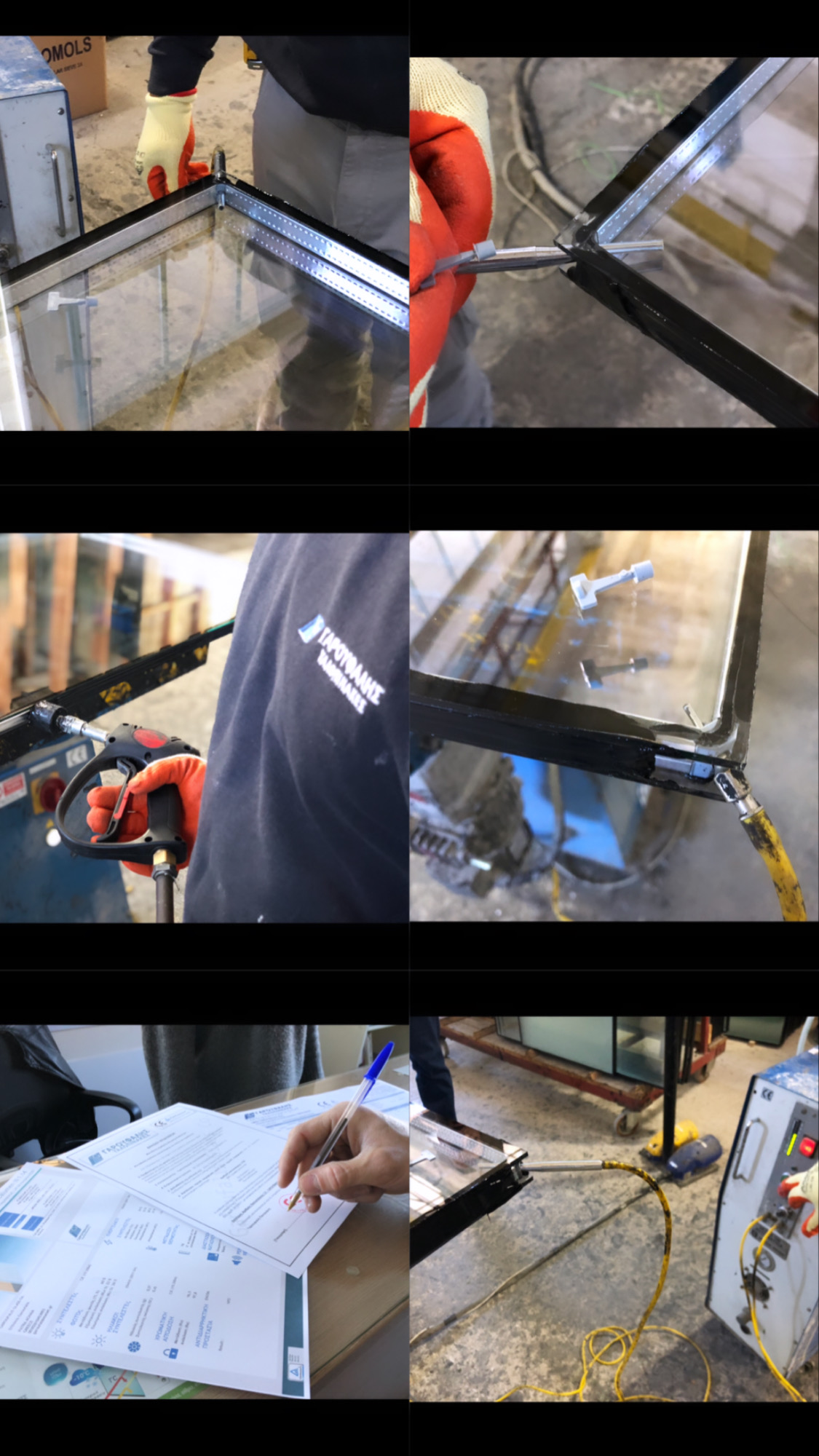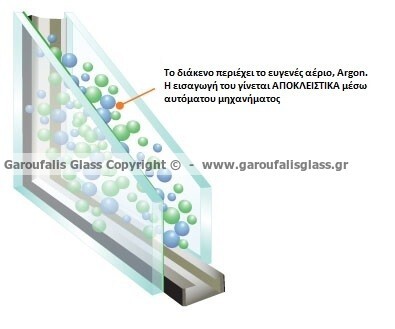Items list
In the following article of our Glass Expert, we will know a very important component that is suitable to be applied to modern double glazing:
The ARGON
Learn all about Argon.
Why is it placed in energy and what does it offer?

What is Argon?
Argon is an inert (noble) colorless, odorless, tasteless and non-toxic gas which (co) exists in the atmosphere close to 1%, along with oxygen and nitrogen.
What does the double-glazed balloon contain?
Good quality Energy crystals (double or triple) on windows have the ability to reflect heat wherever it comes from, winter to summer. Energy Double crystals create an empty air chamber while triple two empty air chambers. Many people think that there is atmospheric air inside the balloon while others think that there is a vacuum (that the air has been removed). The simple double crystals actually had and still have atmospheric air. But this should not apply to energy.
What are the benefits of ARGON gas in Energy Double Crystals?
Argon, in addition to being non-toxic, colorless and odorless, is mainly heavier than ambient air and thus, without altering the optics, can offer better insulating performance on the glass. A special machine replaces the atmospheric air with Argon, and thus the double energy crystal has maximum efficiency. Studies by European institutes have shown that filling with argon instead of air can increase the efficiency of windows by up to 30%.
How does ARGON work?
Heat transfer through a gas is a function of: The viscosity (the resistance they show during their flow), and - The specific heat (heat capacity per unit mass). Monoatomic gases such as argon, krypton and xenon are often used because they do not transfer heat through the flow into the air chamber of a double glazing, and due to the low heat capacity (relative to multi-atomic gases) they provide to the glazing as we say lower Ug-value.
Myths about Argon gas.
Glass manufacturers who do not have the necessary equipment to introduce gas into the air chamber of an insulating glass, have created some… myths about argon that not only do not apply but also blatantly wrong it !!!
* Argon gas evaporates (or breaks down). It would never be possible for gas to evaporate through a very well-sealed double-glazed chamber. For this to really happen, the perimeter insulation of the glass must have been damaged, at which point the glass will start to vaporize and become cloudy inside. This only happens with the Hot Sealing of the double glazing.
The hot sealing method is not suitable in hot climates such as Southern Europe and consequently in Greece, since high temperatures can re-liquefy the hot glue and therefore create holes through which Argon escapes & penetrates the known moisture that destroys the double glazing.
The solution to prevent the above, is the Double Sealing with COLD SELF-ADHESIVE, a mixture of two components (9: 1) which polymerizes and is impossible to liquefy in the future for any reason. For this reason you will hear in the competition "bad words" about gas, ask the 2 simple questions: Do you stick with COLD ADHESIVE? Do you give certification for COLD SEALING & GAS PAYMENT? The conclusion is yours to make.
* Argon gas offers nothing. The presence of argon gas inside the glass is systematically applied in northern Europe many decades before we "discover" it. In North America as well, energy glazing is required to have argon to obtain Energy Star certification.
* Argon gas is not insulating. Argon belongs to the heavy noble gases and is considered chemically inert and unable to form compounds. It has a thermal conductivity 67% lower than that of air. Because it is heavier than steam, it suppresses the movement of gas inside the air chamber, so when it is inside a double-glazed air chamber it does not transfer heat from one glass to another. This enhances the insulating properties of the glass.
* Argon gas is expensive. Crude has a very low cost in proportion to the amount contained in a double glazing. For example, our company does not charge extra for filling energy double crystals with argon.
* Argon gas does not work in summer (?). The truth is that in periods when there is an increased temperature, its movement accelerates, but even then and in no case does argon behave like the atmospheric air.
* Detecting Argon inside a glass pane is not technically possible. But if a double crystal has a case, diagonally there are visible gas inlet-outlet valves.
* In any case, the most complete information, the discussion with a specialized person (glass in the specialty) & the CE certification, are the only ways to be sure about the product you are buying.
Article:
Garoufalis P. Efthimis
* Economist, BSc Economics University of Patras
* Exports Manager "Garoufalis Glass"
* Specialization in Energy Double Glazing Topics
* Specialization in performance studies of Thermal Insulation / Sound Reduction through Glazing.


